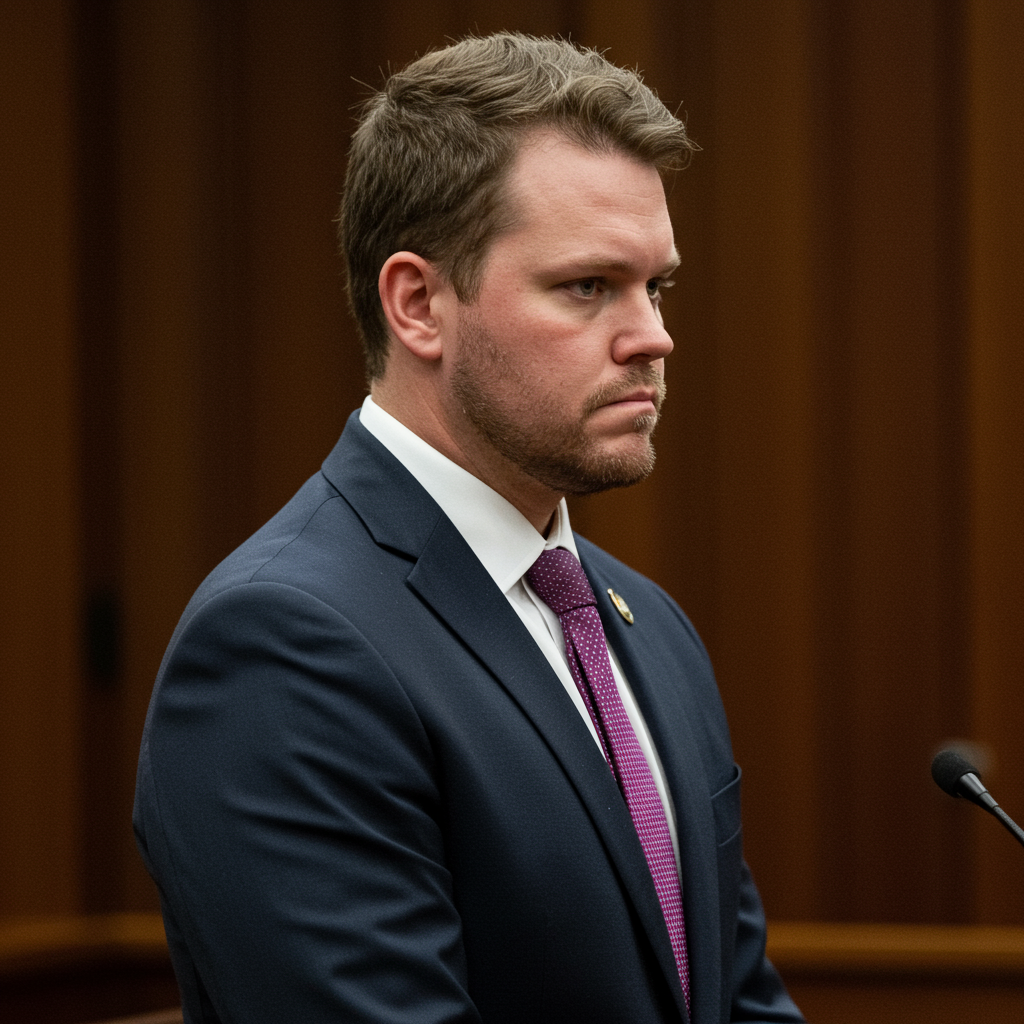In a dramatic and unexpected turn, Bryan kohberger pleaded guilty Wednesday to the brutal 2022 stabbing deaths of four University of Idaho students. The guilty plea, entered in Boise, Idaho, comes as part of a deal with prosecutors, allowing the former criminology graduate student to avoid a potential death sentence. The agreement resolves a case that stunned a quiet college town and captured national attention, just weeks before a high-profile trial was set to begin.
Kohberger, 30, admitted his culpability during a court hearing before Idaho Fourth Judicial District Judge Steven Hippler. His admissions marked the first time he had publicly spoken about the horrific crimes. When asked if he admitted to killing each of the four victims, Kohberger reportedly responded with a simple “Yes.” He also pleaded guilty to a related burglary charge. Throughout the hearing, observers noted Kohberger remained notably impassive, described by reporters as “stone cold” and showing “no emotion.”
Details of the Plea Agreement and Court Hearing
The plea deal struck between kohberger’s defense and Latah County prosecutors is comprehensive. In exchange for his guilty plea to four counts of first-degree murder and one count of felony burglary, the state agreed to withdraw the possibility of the death penalty. The agreement stipulates that Kohberger will serve four consecutive life sentences in state prison without the possibility of parole. A critical term of the deal also mandates that he waive his right to appeal both the conviction and the sentence. This specific condition is designed to provide finality for the victims’ families and prevent decades of potential appeals.
During the hearing, Latah County Prosecuting Attorney Bill Thompson provided the court with an overview of the evidence that had been gathered against Kohberger. He outlined how authorities believed Kohberger entered the victims’ off-campus home in Moscow, Idaho, through a sliding back door in the early morning hours of November 13, 2022. Thompson detailed a sequence where Kohberger allegedly first attacked Madison Mogen and Kaylee Goncalves together. He then reportedly encountered Xana Kernodle, who was awake (and had potentially just received a DoorDash order), before stabbing her and her boyfriend, Ethan Chapin, who was asleep in bed, as Kohberger prepared to leave the residence. The weapon was described as a long-blade knife.
Judge Hippler acknowledged the intensity of public interest surrounding the case at the start of the hearing. He stated he had received communications attempting to influence his decision, which he deemed “inappropriate.” The judge emphasized that his role was to decide whether to accept the plea based on legal merit and that he could not compel the prosecution to seek the death penalty.
Evidence Linking Kohberger to the Crime Scene
Investigators built their case against Bryan Kohberger using a combination of forensic evidence and digital data. A key piece of evidence cited by prosecutors was a knife sheath discovered near one of the victims’ bodies in Madison Mogen’s room. Genetic material recovered from this sheath reportedly provided a “single source” male DNA profile that authorities matched to Kohberger.
Beyond DNA, investigators also used cellphone data and surveillance video. Cellphone records reportedly showed Kohberger’s phone pinging near the victims’ Moscow residence on multiple occasions in the months leading up to the murders – at least a dozen times, according to authorities. His phone was also tracked in the vicinity on the night of the killings, although his defense had previously suggested he was simply on a long drive by himself at that time. Surveillance cameras in the area had also captured a white Hyundai Elantra, a vehicle similar to Kohberger’s, driving near the home repeatedly on the night of the crimes. Online shopping records further indicated that Kohberger had purchased a military-style knife and a sheath months before the November 2022 attacks, similar to the one found at the scene. Prosecutors also reportedly referenced a selfie Kohberger took just six hours after the murders as part of the evidence against him.
The Nationwide Search and Arrest
The brutal and seemingly random nature of the murders in a community unaccustomed to such violence sparked widespread fear and a massive, nationwide manhunt. The focus on the white sedan and the use of genetic genealogy were crucial elements in the investigation. Bryan Kohberger, a PhD student in criminology at nearby Washington State University, which is only a short drive from Moscow, became a suspect weeks after the killings. He was ultimately arrested at his parents’ home in Pennsylvania in late December 2022. The case had been moved from northern Idaho to Boise due to extensive pretrial publicity, which legal experts believed could have made selecting an impartial jury difficult.
Motive Remains Undisclosed
Despite the guilty plea and Kohberger’s admission that he committed the stabbings, the motive behind the horrific attacks remains unclear. Authorities previously stated there was no apparent connection between Kohberger and the four victims – Kaylee Goncalves, Ethan Chapin, Xana Kernodle, and Madison Mogen – who were all friends and active in the University of Idaho’s Greek system. The reasons why two other roommates who were present in the house were unharmed have also never been publicly explained. Legal experts speculate that, with the case now resolved through a plea deal rather than a full trial, Kohberger’s true motive may never be revealed publicly.
Starkly Different Reactions from Victims’ Families
The announcement and formalization of the plea deal elicited deeply divided reactions from the families of the four students. The family of Kaylee Goncalves voiced significant opposition to the agreement and how it was handled. They expressed being “beyond furious at the State of Idaho,” feeling that the system had “failed” them. Kaylee’s sister, Aubrie Goncalves, described the timing of the plea deal announcement, so close to the scheduled trial date, as “shocking and cruel.” The Goncalves family reportedly felt they were not adequately consulted by prosecutors regarding the terms of the deal, alleging they only received details via email. They desired a full confession from Kohberger, details about exactly what happened, and the location of the murder weapon, arguing they deserved to know “when the beginning of the end was.” They emphasized a desire for accountability and dignity for their loved ones, not just vengeance, lamenting that the system seemed to protect Kohberger’s future while the victims “have been silenced forever.”
In stark contrast, the family of Madison Mogen expressed their full support for the plea agreement. Ben Mogen, Madison’s father, welcomed the deal, stating it was the “best outcome possible” and would allow families to grieve without the prolonged stress and emotional burden of a potentially lengthy and “gruesome” trial, years of appeals, and the “potential for mistakes along the way.” He told reporters that this resolution prevents Kohberger from spending decades dwelling on his actions, allowing the families to focus on navigating life without their children. The family of Ethan Chapin also reportedly supported the deal. Kohberger’s own family issued a rare statement requesting privacy and respect from the media as the legal process concluded.
What Happens Next
With the guilty plea accepted, the next crucial step in the case is the official sentencing hearing. Judge Hippler has set the sentencing for July 23 in Boise. During this hearing, the victims’ families are expected to have the opportunity to deliver victim impact statements, directly addressing the court and potentially Kohberger himself. While there is hope among some families that Kohberger might offer further explanation or remorse at sentencing, it remains uncertain whether he will speak beyond his previous one-word responses, particularly given that a gag order on the case’s participants remains in effect. Documents related to the case have largely remained sealed under this order and are not expected to be unsealed until after the sentencing is complete. The resolution through a plea avoids a lengthy, high-profile trial that would have revisited the horrific details of the crime in public.
Frequently Asked Questions
What were the specific terms of Bryan Kohberger’s guilty plea deal?
Bryan Kohberger pleaded guilty to four counts of first-degree murder and one count of felony burglary. In exchange for his plea, prosecutors agreed to remove the death penalty as a sentencing option. The deal stipulates that Kohberger will receive four consecutive life sentences in prison without parole and must waive his right to appeal the conviction or sentence.
What key evidence was presented against Bryan Kohberger in the Idaho murders case?
Key evidence against Kohberger included DNA matching his profile found on a knife sheath discovered at the crime scene, cellphone data tracking his movements near the victims’ home both before and on the night of the murders, and surveillance video showing a vehicle matching his white Hyundai Elantra in the area. Authorities also cited online purchase records for a military-style knife and sheath months before the killings.
Why did the families of the Idaho murder victims react differently to the plea deal?
Reactions were split due to differing priorities and levels of satisfaction with the legal process. The Goncalves family strongly opposed the deal, feeling they were not adequately consulted, that the timing was cruel, and that it denied them a full public trial and potential confession. The Mogen and Chapin families supported the plea, expressing relief at avoiding the stress and trauma of a lengthy trial and years of appeals, preferring the certainty of a life sentence and the ability to focus on grieving.


